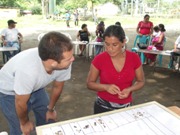DIPLOMA 240: Blended Online/Live Workshop Training Program
Designing & Funding Nonprofit Projects
| Blended Training Program—Including:
A 5 Day Live Workshop. |
Designing & Funding Non Profit Programs and Projects.
In this blended learning, 4 month training program you will participate in:
PHASE I: Four weeks. January 11 – February 5, 2016.
- 3 weeks pre-workshop. January 11 – 29, 2016. Guided Field Data Collection: Community Needs Assessments. Conduct a needs assessment with a target population in preparation for use in the workshop—guided through distance learning by CSDi staff. We will provide all of the tools and information you need to conduct the needs assessments.
- 5 days. A Face-to-Face Workshop. January 30 – February 5, 2015. Full Project Design and Development. Working with the CSDi workshop leader, you will use your needs assessment to begin the development of a complete, fundable, launchable project.
- 2 optional field days. January 30 & 31, 2016. Don’t have community access? Participate in two additional field days the Saturday and Sunday prior to the workshop conducting a participatory needs assessment with our local partner near the workshop venue.
- Completion Certificate. Receive a workshop completion certificate from the Center for Sustainable Development.
PHASE II: 12 weeks. February 8 – April 22, 2016.
- Post-workshop: Form a project team, design capacity-building workshops, approach donors, and launch your project.
- OL 240 Diploma. Upon completion, receive a Diploma from the Center for Sustainable Development.
Join us for this transformative program.
Would your organization like to learn how to increase efficiencies and impact in their programs? This four-month diploma program will provide a system of building block activities for you to use on the ground in developing and implementing successful nonprofit programs. The techniques illustrated in this training course use a step-by-step progression to lead participants through problem assessment, project design and implementation. You will package your project design components for enhancing donor communications.
Non profit program effectiveness can be limited by non profit staff’s poor access to mission-critical information and training. We deliver solutions by providing cutting-edge information, tools, time-saving templates, training and expert consultancy through blending a face-to-face workshop with distance learning—and lead you in developing a real project for your organization.
This workshop is not based upon lectures—it is based upon action. We will not be using case studies: Immediately before the live workshop you will have 3 weeks to facilitate a needs assessment with a real community where your organization works. In the live workshop, you will then develop the following tangible outputs, tools and techniques for your specific project based upon your community’s assessment.
- clearly assess need in a target community
- develop a project outline with a problem statement, underlying causes, and solution oriented activities
- research activities that have worked to solve the project challenge
- develop project management documents: log frames, budgets and schedules
- develop a Letter of Inquiry for a donor presentation
This blended learning program will lead you through the development of a real project, in real time, in a real community, and leave you with the practical field tools and resources to sustain it.
| Resources for Designing & Funding Non Profit Programs. |
 |
• We will provide access to a library of resources for the different challenges that you’re likely to encounter: studies, manuals, guides, and community capacity building resources.
• You will be able to download a full range of document templates for you to customize to best address your project.
• Course facilitators will work with you individually as consultants throughout the program in developing your specific project. |
Although most participants in our non profit programs are from North America or the U.K, we have had the pleasure of also working with non profit participants from: Australia, Austria, Belgium, Canada, Denmark, Finland, France, Germany, Ireland, Italy, Japan, Monaco, the Netherlands, New Zealand, Norway, Spain, and Switzerland.
Projects that participants have developed through the diploma program have included activities for the elderly, adaptation to climate change, alternative energy, bicycle paths, business skills training for immigrants, community development, conservation, elderly care facilities, food banks, community gardens, financial literacy, formation of a farmer’s association, natural resource management, recycling, revitalization of an Iowa town, income generation, and vocational skills training.
We look forward to working with you in this training program,
Sincerely,
Tim Magee, Executive Director
Center for Sustainable Development
Would you like to
subscribe to this newsletter?
